Blog (446 found)
Burma Government Must Prevent Ongoing Communal and Religious Violence by Tackling Impunity
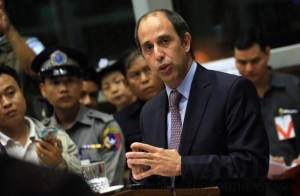 This week, United Nations Special Rapporteur on the situation of human rights in Burma, Tomás Ojea Quintana, reported that during his recent 10-day official mission to Burma his convoy was besieged by anti-Muslim protestors in Meikhtila, Mandalay Region, the scene of anti-Muslim violence in March of this year. However, the week’s unrest did not stop there: a few days later, Buddhist mobs burnt down dozens of shops and homes belonging to Muslims in Kantbalu, Sagaing Region, after a Muslim man was arrested for allegedly attempting to rape a Buddhist woman. Unfortunately, such incidents in Burma are nothing new: 2013 has seen outbreaks of religious and communal violence afflicting increasing numbers of towns across the country. Violence flared up most notably in Meikhtila on 20 March, lasting for more than a week, and also on 28 and 29 May in Lashio, Shan State, where one Muslim was killed and four Buddhists injured, and on 29 May in Mone, Kyauk Gyi Township, Pegu Region, where mobs destroyed a mosque and a madrasa. In addition, nearly 250,000 people, the majority of whom are Muslims, have been displaced by the violence across the country thus far […]
This week, United Nations Special Rapporteur on the situation of human rights in Burma, Tomás Ojea Quintana, reported that during his recent 10-day official mission to Burma his convoy was besieged by anti-Muslim protestors in Meikhtila, Mandalay Region, the scene of anti-Muslim violence in March of this year. However, the week’s unrest did not stop there: a few days later, Buddhist mobs burnt down dozens of shops and homes belonging to Muslims in Kantbalu, Sagaing Region, after a Muslim man was arrested for allegedly attempting to rape a Buddhist woman. Unfortunately, such incidents in Burma are nothing new: 2013 has seen outbreaks of religious and communal violence afflicting increasing numbers of towns across the country. Violence flared up most notably in Meikhtila on 20 March, lasting for more than a week, and also on 28 and 29 May in Lashio, Shan State, where one Muslim was killed and four Buddhists injured, and on 29 May in Mone, Kyauk Gyi Township, Pegu Region, where mobs destroyed a mosque and a madrasa. In addition, nearly 250,000 people, the majority of whom are Muslims, have been displaced by the violence across the country thus far […]
Whose Guns Are Silent?
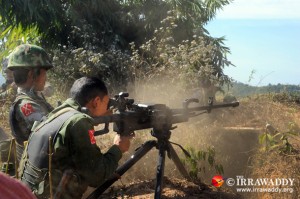 As President Thein Sein once again claimed success in the peace process, the United Nations Special Rapporteur on the situation of human rights in Burma, Tomás Ojea Quintana, was denied permission to visit the active warzone in Kachin State, illustrating the gap between words and reality.
As President Thein Sein once again claimed success in the peace process, the United Nations Special Rapporteur on the situation of human rights in Burma, Tomás Ojea Quintana, was denied permission to visit the active warzone in Kachin State, illustrating the gap between words and reality.
In President Thein Sein’s address for swearing in new deputy ministers on 15 August, he stated that “the guns have gone silent,” echoing his remarks on his visit to the UK in July where he asserted that “very possibly, over the coming weeks, we will have a nationwide ceasefire and the guns will go silent everywhere in Myanmar for the first time in more than 60 years.” The reality is that the guns of the Burma Army are far from silent, and the ethnic people, particularly in Kachin State and northern Shan State, are suffering more under Thein Sein than the previous military regime headed by Than Shwe […]
The Fallen Heroes and Heroines of 8888 Must Be Honored With Accountability
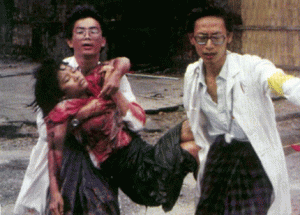 The week of 8888 Silver Jubilee has passed, with many commitments made for the future. Among the many commemorations of 8888 Silver Jubilee, this year Rangoon saw the largest public 8888 anniversary gathering in history with more than 4,000 activists from 88 generation forces and politicians from across the country, border areas and exile, leaders of ethnic armed groups, political parties, farmers, workers, and civil society representatives from different areas of the country as well as from exile attending the ceremony. After two days of open and lively discussions and deliberations on this special event initiated by 88 Generation Peace and Open Society and organized by various 88 generation and young generation activist groups, a crowd of 20,000 people quickly filled up the hall in the morning of 8 August and spilled out into the entrance of the hall to watch the event on a live television screen. Everyone remembers and, for the new generation, wants to remember the historical movement for democracy 25 years ago and the military regime’s brutal crackdown on countrywide mass demonstrations that killed as many as 3,000 peaceful protesters […]
The week of 8888 Silver Jubilee has passed, with many commitments made for the future. Among the many commemorations of 8888 Silver Jubilee, this year Rangoon saw the largest public 8888 anniversary gathering in history with more than 4,000 activists from 88 generation forces and politicians from across the country, border areas and exile, leaders of ethnic armed groups, political parties, farmers, workers, and civil society representatives from different areas of the country as well as from exile attending the ceremony. After two days of open and lively discussions and deliberations on this special event initiated by 88 Generation Peace and Open Society and organized by various 88 generation and young generation activist groups, a crowd of 20,000 people quickly filled up the hall in the morning of 8 August and spilled out into the entrance of the hall to watch the event on a live television screen. Everyone remembers and, for the new generation, wants to remember the historical movement for democracy 25 years ago and the military regime’s brutal crackdown on countrywide mass demonstrations that killed as many as 3,000 peaceful protesters […]
25 Years On, Freedom of Association Remains an Illusion
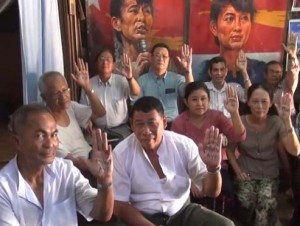 On 27 July, the Public Affairs Management Committee published the draft Association Law with a notice calling for comments and recommendations. The 9 August deadline to send comments allows so little time for recommendations that it makes it almost meaningless. Civil society organizations quickly reacted to the draft bill by publishing a statement endorsed by 87 organizations. The statement rejects the draft law and calls for any discussion in the Parliament to be suspended in order to allow sufficient time for broad and meaningful consultations.
On 27 July, the Public Affairs Management Committee published the draft Association Law with a notice calling for comments and recommendations. The 9 August deadline to send comments allows so little time for recommendations that it makes it almost meaningless. Civil society organizations quickly reacted to the draft bill by publishing a statement endorsed by 87 organizations. The statement rejects the draft law and calls for any discussion in the Parliament to be suspended in order to allow sufficient time for broad and meaningful consultations.
Similarly the Myanmar National Human Rights Commission (MNHRC) draft law was published on 7 July following similar proceedings. Again, the draft law was immediately tabled in the Parliament, limiting time for consultations and recommendations by civil society organizations.
The draft Association Law violates people’s right to freedom of association. The law must be almost entirely redrafted if it is to comply with international legal standards. In its current form it serves no other purpose than perpetuating government’s control over civil society […]
• • •Shwe Gas Pipeline, A Sign of Things to Come
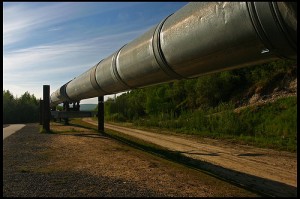 On 28 July, Burma’s Ministers of Energy, the Vice President, the Ambassador of China and a representative from South Korea started the Shwe Oil and Gas Pipeline. It was reported that when the “torches flamed in the sky of Namkham Measuring Station of [Burma]-China Gas Pipeline, a storm of applause and cheers broke out on the ceremony site and Namkham Metering Station.” This image is disturbing: representatives from China, international business and the government of Burma cheered the flames, but no such excitement was felt among the local communities or representatives from social or environmental groups in ethnic areas.
On 28 July, Burma’s Ministers of Energy, the Vice President, the Ambassador of China and a representative from South Korea started the Shwe Oil and Gas Pipeline. It was reported that when the “torches flamed in the sky of Namkham Measuring Station of [Burma]-China Gas Pipeline, a storm of applause and cheers broke out on the ceremony site and Namkham Metering Station.” This image is disturbing: representatives from China, international business and the government of Burma cheered the flames, but no such excitement was felt among the local communities or representatives from social or environmental groups in ethnic areas.
The dual pipelines will travel almost 800km, beginning in Arakan State, passing through Magway and Mandalay Regions and exiting Burma through Northern Shan State. They will cross through various ethnic nationality areas as well as diverse ecosystems, from jungles to mountain ranges.
The pipelines will also traverse ongoing ethnic conflict areas. As recently as April, an international security consultant advised against opening the pipeline due to its path through conflict areas, and warned of the potential for catastrophe […]
• • •Thein Sein’s Words Must be Followed by Action
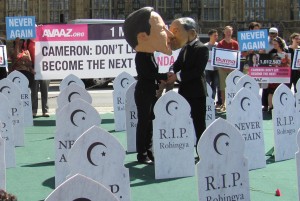 President Thein Sein completed his first visit to the UK and France on 18 July with more promises of reform and was prematurely rewarded with trade and investment discussions, military cooperation and a gloss of legitimacy. Although Prime Minister David Cameron, President François Hollande, as well President Thein Sein, paid lip-service to reform and human rights, this does not disguise the reality of a dire human rights situation, the stalled peace process, and the empty promises of reform that characterize Burma today.
President Thein Sein completed his first visit to the UK and France on 18 July with more promises of reform and was prematurely rewarded with trade and investment discussions, military cooperation and a gloss of legitimacy. Although Prime Minister David Cameron, President François Hollande, as well President Thein Sein, paid lip-service to reform and human rights, this does not disguise the reality of a dire human rights situation, the stalled peace process, and the empty promises of reform that characterize Burma today.
One of the promises that Thein Sein made was that all political prisoners would be released by the end of the year. It has been over two years since Thein Sein assumed the office of President, and the amount of times that world leaders have pushed him on this issue has been countless. Yet there remain hundreds of people languishing in jail for their political activism, while the number of new political prisoners is increasing. On the very day that Thein Sein made this statement, a 74 year-old Rohingya human rights activist in Arakan State was arbitrarily arrested and detained. Just a few days later on 18 July, Daw Bawk Ja, a Kachin human rights activist and member of the National Democratic Force, was unlawfully detained on politically motivated charges […]
• • •Child Soldiers Still Systematically Used in Burma
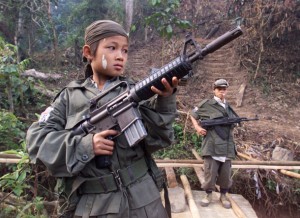 Last 7 July, the Burma Army demobilized 42 child soldiers, bringing the total to 108 discharged in the past 12 months. Although it is unclear exactly how many remain in its ranks, some estimates put the figure at 5,000. Thus, 108 represents just a fraction of the child soldiers employed by the Burma Army to engage in fighting and provide support to the wars being waged in ethnic areas.
Last 7 July, the Burma Army demobilized 42 child soldiers, bringing the total to 108 discharged in the past 12 months. Although it is unclear exactly how many remain in its ranks, some estimates put the figure at 5,000. Thus, 108 represents just a fraction of the child soldiers employed by the Burma Army to engage in fighting and provide support to the wars being waged in ethnic areas.
It has been over one year since the Burma government signed an action plan with the UN to end recruitment and use of children in the armed forces by December 2013. The results, as Joe Becker of Human Rights Watch points out, are pitiful, “One year into the Burma-UN action plan, the Burmese military has failed to meet even the basic indicators of progress.” A host of restrictions on access for the UN Task Force employed to implement this action plan have rendered that agreement almost worthless, as the army continues to use and recruit children for war. On four occasions, the UN Task Force was denied access to military sites believed to house child soldiers. Furthermore, the Burma Army refuses to grant access to the Border Guard Forces (BGF), an arm of the military that operates in many ethnic areas. There is no program within the BGF to identify and release child soldiers, nor to end recruitment. The BGF is under the direct command of the Burma Army and any measures towards solving this issue must include these forces […]
Upper House of Parliament Must Reject the Printing and Publishing Enterprise Law
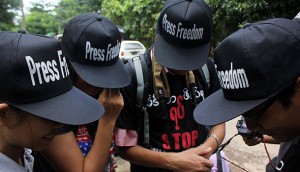 On 4 July, the Lower House of Parliament approved the controversial Printing and Publishing Enterprise Law despite strong opposition and criticism by the interim Myanmar Press Council, local media and freedom of expression watchdogs.
On 4 July, the Lower House of Parliament approved the controversial Printing and Publishing Enterprise Law despite strong opposition and criticism by the interim Myanmar Press Council, local media and freedom of expression watchdogs.
The Ministry of Information introduced the draft law in Parliament last March, a week after the Press Council released its own draft Media Law. This came as a surprise as the Ministry’s draft was written in secrecy, presented to the Parliament before any consultation took place and happened despite an earlier agreement that the Press Council would be in charge of drafting the new media legislation.
As a reaction to this clear attempt by the Ministry to bar the Council’s legislation from being presented to the Parliament, local and international media loudly opposed the Printing and Publishing Enterprise Law. The Committee to Protect Journalists said, “If passed in its current form, the draft law will essentially replace Burma’s old censorship regime with a similarly repressive new one.” Article 19 called for the draft law to be withdrawn or rejected by the Parliament “as it would be a major step backwards for freedom of expression and freedom of the media, restoring prior censorship and full governmental control over the press” […]
• • •“National Race Protection Law” Protects No One
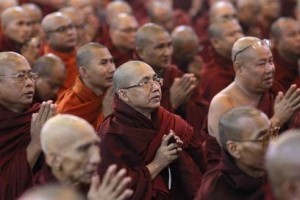 At a convention of over 1,500 monks from around the country in Rangoon on 27 June, senior Buddhist monks said that they endorse a draft law that would place restrictions on marriages between Buddhist women and non-Buddhist men, ostensibly “to protect our race and religion.”
At a convention of over 1,500 monks from around the country in Rangoon on 27 June, senior Buddhist monks said that they endorse a draft law that would place restrictions on marriages between Buddhist women and non-Buddhist men, ostensibly “to protect our race and religion.”
The proposed “national race protection law” states that non-Buddhist men wishing to marry a Buddhist woman would have to convert to her religion. They must also obtain permission from the woman’s parents and local authorities before marrying or risk 10 years in jail.
The proposed bill is in clear violation of the Universal Declaration of Human Rights (UDHR), which states in Article 16(1) that, “Men and women of full age, without any limitation due to race, nationality or religion, have the right to marry and to found a family.”
The bill also violates the Convention to Eliminate All Forms of Discrimination Against Women (CEDAW) […]
• • •Profiling Survey Stokes Refugee Fears
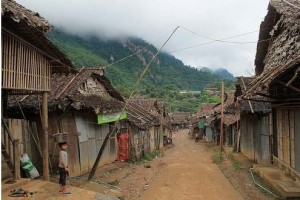 Last Thursday, 20 June, marked World Refugee Day and events were held highlighting the plight of refugees throughout the world, including a United Nations High Commissioner for Refugees (UNHCR) organized event held at the Myanmar Peace Centre in Rangoon. According to the UNHCR, there are around 650,000 displaced people in Burma and around 150,000 refugees on the Thailand-Burma border, many of whom were born there. Yet as the discourse from the government of Burma and the international community is moving towards repatriation for those on the border, anxiety is building with refugees worrying that they will be forced to return to a place where they will live in fear of conflict, will have no livelihood opportunities, and no land to call home.
Last Thursday, 20 June, marked World Refugee Day and events were held highlighting the plight of refugees throughout the world, including a United Nations High Commissioner for Refugees (UNHCR) organized event held at the Myanmar Peace Centre in Rangoon. According to the UNHCR, there are around 650,000 displaced people in Burma and around 150,000 refugees on the Thailand-Burma border, many of whom were born there. Yet as the discourse from the government of Burma and the international community is moving towards repatriation for those on the border, anxiety is building with refugees worrying that they will be forced to return to a place where they will live in fear of conflict, will have no livelihood opportunities, and no land to call home.
In recent weeks, a survey initiated by the Thai government and the UNHCR, and implemented by the Mae Fah Luang Foundation, an organization under Thai royal patronage, is being carried out, profiling refugees in Mae La camp. The survey has been heavily criticised as having insufficient input from refugees, and being designed to favour repatriation, and is thus stoking the refugees’ anxiety. The rationale behind the profiling is based on the UNHCR’s “preparation” for return, in that when the conditions for refugee return are right, relevant stakeholders will be sufficiently prepared to assist in a durable return to Burma. According to the UNHCR, “The profiling process will be a fully consultative and participatory process, where the refugees will be involved in every step. The questionnaire will be designed through consultations with the refugees.” Yet the reality of refugees’ participation in the process has been flawed and many refugees feel that the survey reflects a strong preference for return to Burma as the only viable solution, as opposed to staying in Thailand or resettling to a third country […]









 All posts
All posts